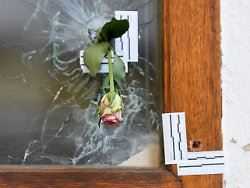Thursday December 24th 2020
Attack in Vienna in November
Report accuses authorities of omissions
The attack on November 2 in Vienna killed four people. The perpetrator Kujtim Fejzulai was also shot. A report now accuses the Austrian authorities of not having recognized the danger in time. Despite warnings from abroad.
An investigation report into the Islamist attack in Vienna on November 2nd revealed serious failings by the Austrian security authorities. The authorities missed several opportunities to recognize and react to the threat posed by the later assassin Kujtim Fejzulai, according to a first report by a government inquiry committee, which was only published in excerpts on Wednesday evening for security reasons.
After the young Islamist was released from prison in December 2019, it took until October for a risk assessment to be completed, the report said. Accordingly, the 20-year-old from North Macedonia assumed a "high risk".
The attacker opened fire in a lively district of Vienna in early November. He killed four people and injured 14 before being shot by police himself. The Islamic State (IS) jihadist militia claimed the act for itself.
Warning of German authorities
Fejzulai had been sentenced to the previous prison term for trying to travel to Syria to fight on the side of IS. However, he did not have to serve the full 22-month sentence. In early December 2019, he was released early from custody after apparently faking successful participation in a deradicalization program.
The report's authors criticized the fact that almost ten months had passed before the risk assessment for Fejzulai was made. The threat posed by Fejzulai had already become clear in July when he met well-known German and Swiss Islamists. In addition, the German authorities had informed Austria of the danger posed by Fejzulai.
According to the report, the Vienna State Office for the Protection of the Constitution and Combating Terrorism (LVT) blamed a lack of resources and work overload for the delay. According to the report, an employee of the LVT had tried to warn that Fejzulai's participation in the Islamist meetings proved the existence of a "highly dangerous terrorist cell". However, colleagues from the Federal Office for the Protection of the Constitution and Counter-Terrorism (BVT) had told him to keep silent. The BVT rejects this allegation.
Warning from the Slovak authorities
According to the report, the Austrian authorities missed another opportunity to prevent the attack in July when they were informed by the Slovak authorities that Fejzulai had tried to buy ammunition. Later, the BVT received recordings from surveillance cameras from July 27th, which were only forwarded to the LVT Vienna just under a month later.
This analyzed that the man on the recordings was very likely Fejzulai. An official who called for further action against the Islamist was ignored, according to the investigative committee.
At the end of January, the committee intends to present a more detailed report. Austria's Director General for Internal Security, Franz Ruf, announced that the findings of the investigation will be used in the current reforms of the security authorities. Austria's conservative Chancellor Sebastian Kurz announced after the attack in Vienna that he would take decisive action against "political Islam".
. (tagsToTranslate) politics (t) Austria (t) Vienna (t) terrorist attacks (t) security policy (t) internal security (t) Islamism
